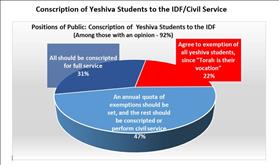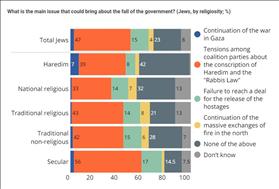What does the Public think? (Hint: opposite to the position of the government!)
78% are opposed to the blanket exemption of the ultra-Orthodox yeshiva students
25/07/2024 14:08
Tags: ultra-Orthodox · exemption ·

Conscription of Yeshiva Students to the IDF
Ahead of Rosh Hashanah, we will conduct and publish the 2024 Religion and State Index survey. We have no doubt that it will reflect an increased criticism among the Jewish public regarding the relationship between religion and politics in Israel. The conflict and debate over the judicial overhaul have intensified this sentiment. Surveys conducted during this time by other entities, notably the Israel Democracy Institute, indicate this trend.
Regarding the central issue on the public, political, and legal agenda in recent months – the conscription of ultra-Orthodox yeshiva students – the opinions of the Jewish public are clear. These views have become even more pronounced since we published the 2023 Religion and State Index data.
A mere 22% support the exemption and accept the argument that these are people for whom "the Torah is their vocation” (compared to 25% who supported this in the 2022 Index).On the other hand, 78% are opposed to the blanket exemption (47% are of the opinion that an annual quota of exemptions should be set for the outstanding and the rest should be required to enlist in military or national-civilian service according to the needs of the State; 31% are of the opinion that everyone should be conscripted for full-time military
64% of the adult Jewish public support a law that drafts the ultra-Orthodox even if it leads to the fall of the government
service).
The June 2024 monthly survey (The Israeli Voice Index) of the Israel Democracy Institute (IDI), addressed, among other topics, the issue of ultra-Orthodox conscription. The survey was conducted following the Supreme Court ruling that mandated the conscription of ultra-Orthodox yeshiva students, after overturning the law that was previously used for their mass exemption. Even before the recent ruling, and certainly afterward, politicians have been attempting to "square the circle" by trying to draft a law that the ultra-Orthodox would agree to (i.e., in practice, ensuring that tens of thousands of yeshiva students of conscription age would not be drafted) while also passing Supreme Court scrutiny to avoid being struck down again.
In this context, it is interesting to examine the survey findings, which indicate growing gaps within Israeli Jewish society and increasing impatience among the secular public. In response to the question, "Do you support passing a new Conscription Law only if it provides a response to the IDF’s current needs, even if this results in the breakup of the coalition and new elections?" 64% of the adult Jewish public responded affirmatively, meaning they support a law that drafts the ultra-Orthodox even if it leads to the fall of the government. This was the position of 81% of the secular public and 68% of the traditional non-religious public.

The Main Issue That could Bring About the Fall of the Government
In this regard, it is also interesting to see responses to the question, “What is the main issue that could bring about the fall of the government?” We highlighted this surprising reality at the beginning of the newsletter, and it is clear to us that this is a reality unfamiliar and perhaps not understood by many of our readers in the Diaspora, who do not sense the complexity of the public arena in Israel, where issues of religion and state play a central role in the consciousness of the Jewish public even in times of crisis and war.
The most interesting finding was that in all groups, the continuation of the war in Gaza, the continuation of the fighting in the north, and failing to reach a deal for the release of the hostages are not seen as factors that could lead to the fall of the government. The issue most commonly viewed by respondents (44.5%) as having the potential to bring down the government is that of tensions between the Haredi parties and the other parties in the coalition, against the backdrop of the conscription of Haredim and the “Rabbis Law”.